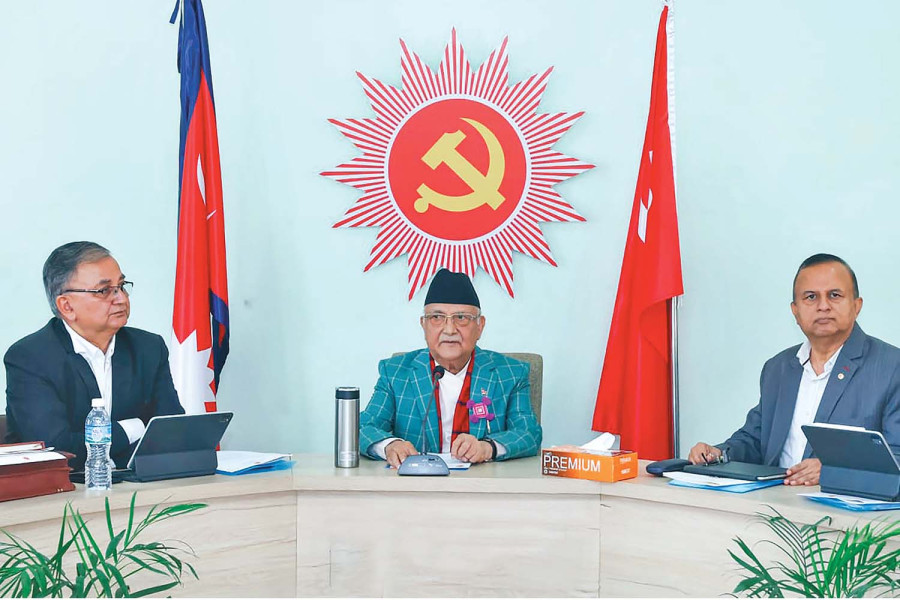Politics
Ruling UML already eyes elections 3 years away
Some experts say it’s unnatural for a ruling party to be focussing on the next elections rather than on governance.
Purushottam Poudel
Even if CPN-UML is leading the government, its eyes appear to be trained on the upcoming election.
While some political analysts argue that the party should be more focussed on delivering from its position of power, others say it should be taken as natural for a political party in a democracy.
After facing poor results during the by-elections held earlier this month, the party recently passed six resolutions aiming to become the largest in the 2027 general elections.
The resolutions were passed during a two-day workshop in Kathmandu that concluded on Sunday and was attended by in-charges, presidents, and secretaries of provincial, district, and fraternal organisations. The workshop aimed to make the party organisation more dynamic and connect with the people.
Aiming to give the party decisive political power, it has also announced a three-month campaign at the ward level starting on January 16.
The workshop concluded that although UML hopes to become the largest party through the 2027 elections, the party committees, in their current form, were ineffective and not well-positioned to achieve that goal. The workshop also decided to intensify the organisation-strengthening campaign.
All these moves indicate that the UML is currently more focussed on the 2027 elections than on governing.
Political historian Rajesh Gautam finds it unnatural that instead of focusing on delivery and addressing the growing public disenchantment towards political parties, the ruling political party is focusing on the next election.
“What makes one believe that political parties that have failed to deliver good governance at present will do so after the next election?” Gautam questions.
Gautam stressed that since political parties do not have a specific plan and vision, they are making lofty plans to engage their cadres.
The UML came in second in the local and federal elections held in 2022. For a brief time, the party was also in the government led by CPN (Maoist Centre) chair Pushpa Kamal Dahal, formed soon after the November 2022 federal and provincial elections.
However, when the Maoist Centre changed its coalition partner, joining hands with the Nepali Congress, the UML was relegated to the opposition party at both the federal and provincial governments. But the party got back in power on March 4, first collaborating with the Maoist Centre as a coalition partner and later with Congress, following the July 1 midnight agreement.
Whether in the government or the opposition, the UML’s focus appears to lie on the upcoming election.
Chandra Dev Bhatta, a political analyst, says that a political party focusing on the upcoming election should be taken as natural; it is their long-term political plan.
“Since the election result 2022 delivered a hung Parliament, no political party can single-handedly lead the government now,” Bhatta said. “Political parties are focussing on the upcoming election to avoid that situation.”
After the UML realised that its strength was diminishing after conducting the mid-hill highway-centric political campaign last year, it is now giving its full attention to strengthening its party organisation, Bhatta said. The party had expected a positive result in the just-concluded local-level by-election; however, the result was contrary to its expectations, which forced it to focus rigorously on the upcoming election.
“But it is not only the UML that is concentrating on the next election,” Bhatta added. “Other major political parties like Congress and Maoist Centre are also organising various programmes aimed at the next election.”
The UML had launched a mid-hill highway-centric political campaign in December last year, aiming to interact with the local communities in 26 districts connected by the highway. UML then organised 30 mass assemblies and interacted with locals through over 100 gatherings during the two-week-long tour.
The campaign, which started in Jhulaghat of Baitadi on December 1, concluded 17 days later when it reached Chiwabhanjyang in the far-eastern part of the country.
Before this, in February 2023, UML also organised a ‘Mission Grassroots’ campaign to strengthen the party's ideological organisation, which was also focused on the next election.
If every political party focuses on the upcoming election, what will become of the current people’s mandate delivered through the 2022 election?
“When political parties are not ideologically bound, they are permanently looking forward to the next election,” said CK Lal, another political expert. “This is what’s currently happening in Nepal.”
Lal further said that when political parties fail to improve their performances, their only motive is to win the election based on their organisational strength.
But Jhalak Subedi, a political analyst, says that consolidating the party's strength is a regular political process that has nothing to do with the earlier election mandate.
Political parties might have felt a gap in connecting with the public, so they plan different campaigns to connect with the public, Subedi says. “These campaigns should not be considered otherwise.”




 17.12°C Kathmandu
17.12°C Kathmandu















